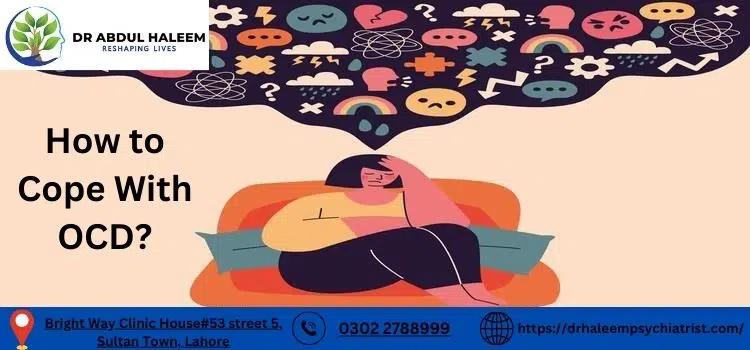Do you sometimes find yourself obsessively washing your hands, counting your steps, or having intrusive thoughts that just won’t go away? If so, you may be struggling with Obsessive Compulsive Disorder (OCD). You must have to learn how to cope with OCD for healthy wellbeing.
In this blog post, we’ll discuss the basics of OCD before providing strategies for coping with and managing its symptoms.
Let’s dive in to get more details.
How To Cope With OCD?

Before we dive into coping strategies, let’s first understand what OCD is. Obsessive Compulsive Disorder (OCD) is a mental health disorder that causes individuals to have recurring and unwanted thoughts (obsessions) and repetitive behaviors (compulsions). These obsessions and compulsions can greatly interfere with daily life, causing distress and anxiety.
Coping Strategies and Tips
Living with OCD can be challenging, but there are strategies and skills that can help manage symptoms. Here are some tips for coping with OCD:
Seek professional help:
The first step in managing OCD is seeking professional help. A therapist can provide a proper diagnosis and create an individualized treatment plan for your specific needs. This may include medication, therapy, or a combination of both.
Cognitive-behavioral therapy (CBT):

CBT is a type of therapy that helps individuals identify and change negative thought patterns and behaviors. This can be an effective treatment for OCD as it focuses on challenging and changing obsessive thoughts and compulsive behaviors.
Exposure and response prevention (ERP):
ERP is a type of CBT that gradually exposes individuals to their obsessions and helps them learn to resist the urge to engage in compulsive behaviors. This can help reduce anxiety and decrease the frequency of compulsions.
Practice self-care:
Taking care of yourself is essential when coping with OCD. This means getting enough sleep, eating a balanced diet, and engaging in activities that bring joy and relaxation. It’s also important to set aside time for yourself each day to recharge and de-stress.
Join a support group:
Connecting with others who also have OCD can be helpful in managing the disorder. Support groups provide a safe and understanding space to share experiences, and coping strategies, and offer support to one another.
Educate yourself:
Learning more about OCD can help you better understand and cope with the disorder. There are many resources available, including books, online articles, and support groups.
Seek Professional Help
It’s always recommended to seek professional help when coping with OCD. A trained therapist can provide valuable support, guidance, and a personalized treatment plan for managing symptoms. If you suspect you or someone you know may have OCD, reach out to a mental health professional for an assessment. Remember, there is no shame in seeking help and taking care of your mental health is essential for your overall well-being.
What Are The Symptoms of OCD?
The symptoms of OCD can vary from person to person, but there are some common signs to look out for. These include:
- Obsessive thoughts or fears that lead to anxiety
- Repetitive behaviors or rituals that are difficult to control
- Difficulty controlling one’s thoughts or actions related to obsessions or compulsions
- Distress and anxiety caused by obsessions and compulsions
- Spending excessive amounts of time on rituals and avoidance behaviors
- Feelings of guilt or shame if rituals are not performed
It’s important to note that everyone experiences OCD differently and may have different symptoms. It’s always best to seek a professional diagnosis if you suspect you or someone you know may have OCD.
What are the Treatments for OCD?
There are a variety of treatments available for managing OCD, including therapy and medication. Cognitive Behavioral Therapy (CBT) is often the recommended form of therapy for OCD, as it focuses on changing thought patterns and behaviors through exposure and response prevention techniques. Medication, such as selective serotonin reuptake inhibitors (SSRIs), may also be prescribed to help manage symptoms. It’s important to work with a mental health professional to determine the best treatment plan for you.
What are the causes of OCD?
The exact cause of OCD is unknown, but research suggests that a combination of genetic, environmental, and neurological factors may play a role. It’s also believed that imbalances in serotonin levels (a chemical in the brain) can contribute to the development of OCD. Additionally, life events such as trauma or stress may trigger or worsen symptoms of OCD.
Conclusion
Coping with OCD can be challenging, but it’s important to remember that you are not alone and that there are resources and strategies available to help manage the disorder. So learn How to cope with OCD, and start living a healthy life.
Seeking professional help, practicing self-care, and learning more about OCD can all contribute to finding ways to cope and live a fulfilling life with the disorder.
FAQs
Can OCD be a mental illness?
Yes, OCD is considered a mental health disorder. It is often categorized as an anxiety disorder and can greatly impact daily life if left untreated.
Is OCD a human behavior?
No, OCD is not a behavior but rather a disorder that affects thoughts and behaviors. It’s important to understand that individuals with OCD cannot simply stop engaging in obsessive thoughts or compulsive behaviors without proper treatment and support.
Is OCD a normal thing?
No, OCD is not a normal behavior or experience. It is a disorder that can cause significant distress and interfere with daily life. If you are experiencing symptoms of OCD, it’s important to seek professional help for proper diagnosis and treatment.


